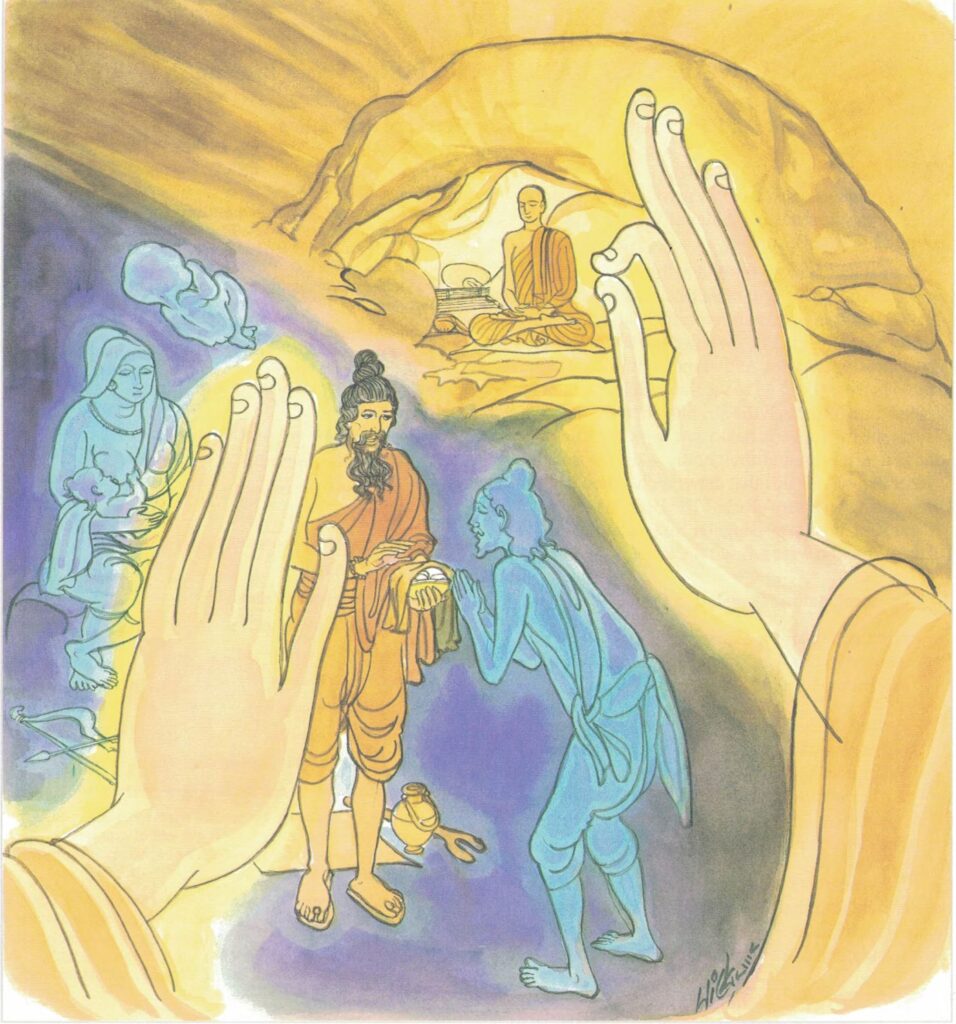Pali text, illustration and English translation of Dhammapada verse 396:
na cā’haṃ brāhmaṇaṃ brūmi yonijaṃ mattisambhavaṃ |
bhovādī nāma so hoti sace hoti sakiñcano |
akiñcanaṃ anādānaṃ tamahaṃ brūmi brāhmaṇaṃ || 396 ||
396. I call him not a brahmin though by womb-born mother’s lineage, he’s just supercilious if with sense of ownership, owning nothing and unattached: that one I call a Brahmin True.

What is a Brāhman?
The story goes that a certain Brāhman one day said to himself, “The monk Gotama calls his own disciples ‘Brāhmans.’ Now I was reborn in the womb of a Brāhman mother; therefore he ought to apply this title to me too.” So he approached the Buddha and asked him about the matter. Said the Buddha to the Brāhman, “I do not call a man a Brāhman merely because he received a new existence in the womb of a Brāhman mother. But he that is without worldly possessions, he that grasps not after the things of this world, him alone I call a Brāhman.”
Explanatory Translation (Verse 396)
yonijaṃ mattisambhavaṃ brāhmaṇaṃ ahaṃ na ca
brūmi sa ce sakiñcāno hoti so bhovādi nāma hoti
akiñcanaṃ anādānaṃ taṃ ahaṃ brāhmaṇaṃ brūmi
yonijaṃ mattisambhavaṃ [mattisambhava]: born in the womb of a brahamin mother; brāhmaṇaṃ [brāhmaṇa]: a brāhmin; ahaṃ na ca brūmi: I will not call; sa ce sakiñcāno [sakiñcāna]: if he possesses blemishes; so bhovādi nāma hoti: he could be called a person who goes about addressing people ‘Sir’; akiñcanaṃ [akiñcana]: if he is free of defilements; anādānaṃ [anādāna]: free of the grip of craving; taṃ: him; ahaṃ: I; brāhmaṇaṃ brūmi: describe as a brāhmin
I would not call a person a brāhmaṇa merely because he is born out of a brāhmaṇa mother’s womb. Nor would I call a person a brāhmin merely because he goes about addressing people as bho (sir). These people are all full of defilements. I call a person a brāhmin who is free of faults and is not given to craving.
Commentary and exegetical material (Verse 396)
brahman: In terms of this stanza, the unnamed brāhman, who met the Buddha, claimed the title Brāhman because he was yonijaṃ mattisambhavaṃ, well-born from the womb of a brāhmin mother. But the Buddha stated that he would describe as a brāhmin only a non-possessor of such defilements as lust, and a person who is not given to grasping.
bhovādi: As a habit, the brāhmins of the Buddha’s days were adept in all the external rituals. They were polite and courteous and addressed people as bho (sir). The Buddha stated that such polite and courteous behaviour was not sufficient. To qualify for the title Brāhmin they must be internally, spiritually pure. Otherwise, they remained mere bho sayers.
brāhmin Doṇa: Among the Brāhmanas who figure prominently in Buddhist literature is Doṇa.
A portion of the remains of the Buddha was claimed by each of the following, namely, King Ajātassatu of Magadha, Licchavīs of Vesāli, Sākyas of Kapilavatthu, Būlīs of Allakappa, Koliyas of Rāmāgāma, Mallas of Pāvā, and a brāhmin of Veṭhadīpa. But the Mallas of Kusinārā maintained that the Buddha passed away within their kingdom, and that they should give no part of the remains to anybody. The brāhmin Doṇa settled the dispute by stating that it was not proper to quarrel over the remains of such a sacred personality who taught the world forbearance, and he measured the remains into eight portions and gave each claimant one measure of the remains. He asked for the empty measure and erected a Stūpa over it. Moriyas of Pipphalivana, too, claimed a portion of the remains, but as there was nothing left for them, they took away the embers and built a mound over them, whereas the others who got the remains built Stūpas in their respective kingdoms embodying the sacred relics of the Buddha.